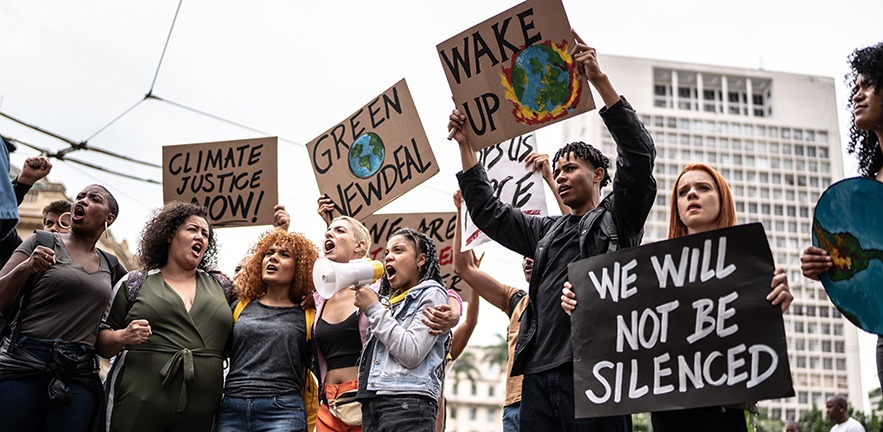It is unrealistic to expect breakthroughs at every climate summit yet they are still important.
by Professor David Reiner, Professor of Technology Policy at Cambridge Judge Business School

As COP27 nears its finale on Friday, one key lens to focus on is the international negotiating process. In the Glasgow summit last year, many of the outstanding issues dating back to the Paris Agreement in 2015 were finally addressed and the so-called “Paris Rulebook” agreed. In this regard, Sharm el-Sheikh was always likely to be underwhelming since there is little left to negotiate and so some have tried to spin COP27 as an “Implementation COP” with a focus on next steps and deployment.
That shouldn’t be seen as disparaging, because while always billed as a “summit” these get-togethers are often not a mountaintop – nor could they ever be given the long-term and tortuous path to controlling climate change.
Arguably the biggest breakthrough at Paris was the commitment to frequent updating of Nationally Determined Contributions (NDCs). This is another glass-half-full aspect of progress to date. Some countries have notably upgraded ambition, such as the EU’s Climate Law with a commitment to 55% emissions reduction below 1990 levels by 2030 (an upgrade from the previous 40% target) or the UK’s 78% target for 2035. Nevertheless, most countries have not submitted new targets and/or not upgraded their level of ambition.
One “outcome” at this COP is the greater focus on so-called “Loss and Damage” provisions (eg to compensate for the impacts of sea-level rise). Last year, the topic was not on the agenda and not a single developed country was willing to offer funding. Even wealthier countries otherwise supportive of greater transfers (including on adaptation) worry that an explicit commitment to covering loss and damage will be tantamount to admitting historical liability. This year, however, the subject has been included on the agenda. Even if no immediate investments emerge, Loss and Damage will now continue to be formally negotiated over for many years forward.
Why climate summits don’t exist in a vacuum
Continued negotiations over climate are invariably influenced by national politics and events, not to mention global crises.
The US surprised many (both inside and outside the country) by agreeing to the Inflation Reduction Act, which allocates $369 billion to support clean energy with generous tax credits for renewables (solar, wind and geothermal), nuclear power, energy efficiency and storage (batteries, hydrogen and pumped hydro) and has the potential to significantly reduce US emissions. A closer look, though, points to many protectionist measures that may exacerbate concerns over international competitiveness. The recent Brazilian election also signals a new Lula government that is much more committed to reducing deforestation in the Amazon, which will encourage wider efforts on forests.
Why the war in Ukraine has placed a focus on energy security and energy prices
The biggest change since COP26 is the impact of the Russian invasion of Ukraine on global energy markets and on the priority placed on energy prices. The unprecedented rise in prices, especially for natural gas, has led to a far greater focus on energy security with countries like Germany not just increasing or restarting their use of older coal and nuclear plants but more significantly making new investments in fossil infrastructure such as liquefied natural gas. Moreover, many European countries have earmarked hundreds of billions of euros (and pounds) to “protect consumers”.
Although public and political support for decarbonisation remains high, it is hard to see how rising economic and security concerns will not impinge on the climate ambitions and especially the funds available to meet these ambitions particularly over the short term. Over the longer term, however, the current crisis does create a greater impetus to shift away from fossil fuels not just on environmental grounds but also because of concerns over price volatility, security, and geopolitics.
Not all COPs are created equal, so let’s tamper expectations
The important thing to keep in mind is that not all COPs are created equal. Kyoto (1997), Copenhagen (2009), Paris (2015) and Glasgow (2021) are all important major milestones over the past quarter century of climate negotiations. That means that most such events are, at best, of minor importance. Indeed, even before the start of COP27, many observers already expecting far more of substance from COP28 in Dubai.
Despite all these challenges, the event itself is still a constructive steppingstone in the sense that climate change is a long, hard protracted slog that will need to maintain momentum over decades and there was never a possibility of being resolved at a single transformative battle at Paris, Glasgow or some future event. Thus, it is not reasonable to expect that there would be a significant and newsworthy COP ever year and so this year’s event is largely a placeholder that awaits more serious developments. Even if COP27 does little more than serve as an opportunity where leading stakeholders from around the world can convene, report progress, exchange best practices and serve as a reminder of how much there is yet to be done then that in itself is some small cause for optimism.


